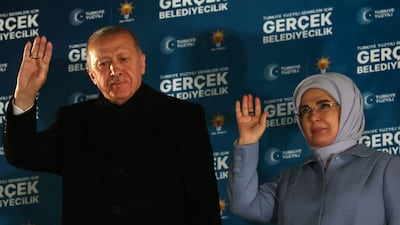The main opposition Republican People’s Party (CHP) topped the governing Justice and Development Party (AKP) in the overall vote and in many key races in Sunday’s local elections, reasserting its relevance in stunning fashion with its best national result in nearly half a century.
With the CHP receiving nearly 38 per cent to the AKP’s 35 per cent, this marked the first time that the former won Turkey’s total vote tally since 1977. It’s all the more impressive in the wake of its stunning double defeat last May, followed by the contentious ouster of longtime leader Kemal Kilicdaroglu, who was replaced by the untested Ozgur Ozel.
Adding to the feat, Turkey’s elections have for years been widely seen as mostly free but less than fair, as candidates for the governing party tend to receive exponentially more coverage on predominantly government-friendly media outlets. And this year, the AKP brought out the big guns.
President Recep Tayyip Erdogan, as usual, campaigned across the country for months. But more so than in the past, the AKP sent cabinet ministers to events in major cities across Anatolia and the south-east. A few weeks ago, a prominent Islamist with more than three million followers on social media even told Turks that it would be a sin to not vote for AKP.
None of it was enough in the end, with Turkish democracy and the opposition emerging as big winners. “Voters decided to establish a new politics in Turkey,” Mr Ozel, who aced his first big political test, said as the results came in.
We might have taken it as a sign of things to come when Devlet Bahceli, the venerable leader of the AKP’s parliamentary partner, the nationalist Nationalist Movement Party (MHP), showed up to vote with welts on his face and his arm in a sling. The parties in power ended up taking a beating, and most ascribe the CHP’s red wave to a few factors.
The first is low voter turnout of 78 per cent, about 10-12 per cent below the norm. Maybe Turks tired of politicians’ aggressively polarising rhetoric over the past decade while seeing no end to the years-long economic crisis? It’s hard to say for sure.

Second, a major surprise was the performance of the Islamically conservative New Welfare Party (YRP). Polling at 3 per cent a few weeks ago, YRP took more than double that – 6.19 per cent – stealing a sizeable chunk of likely AKP voters.
Lastly, the six-party alliance that the CHP embraced last year may have eroded its support, rather than boosted it. Some Kemalists may have been turned off by a union with ultra-nationalists and potential supporters of the Kurdistan Workers’ Party, or by pre-election bickering between party leaders. Standing alone, the CHP had more of a chance to shine.
As a result, its candidates cruised to easy victories in Izmir and Ankara, and in Istanbul, where incumbent mayor Ekrem Imamoglu took Turkey’s largest city by 12 points in what was widely expected to be a dogfight. Mr Imamoglu immediately becomes Mr Erdogan’s chief rival and the presumptive CHP candidate in the next presidential election, though his appeal of a conviction that would levy a political ban is set to resume this month.
With the CHP now in control of 35 of Turkey’s 81 provinces to the AKP’s 24, AKP foes stepped into a changed political landscape as Monday dawned – their most hopeful moment in decades. But those expecting early general elections or Mr Erdogan becoming a lame duck might want to pause for breath.
The CHP’s path to power remains problematic. Start with YRP, which after polling as the fifth or sixth-most popular party came in third overall. Clearly, Islamism remains a powerful force in Turkish politics – not great news for the mainly secular opposition.
YRP attracted voters by hammering home the suffering of Palestinians in Gaza; championing persecuted Muslims has long been an Erdogan calling card. With a few concessions, the AKP will probably bring its former parliamentary partner back onside for the next vote.
Next, Meral Aksener’s IYI Party, a former CHP partner, received less than 4 per cent after polling as high as 13 per cent a few years ago. Ms Aksener has called a party congress, and if IYI dissolves, as some fear, those nationalist votes could revert back to the MHP.
And let’s not forget that nationalism, perhaps the most powerful force in Turkish politics in recent years, was not on the ballot. Your municipality is responsible for garbage pick-up, public transport, and local infrastructure, not for the direction of the economy or foreign policy positions that evoke national pride. This may explain why the CHP did so well in local elections in 2019, yet under-performed last year.
Another difference is that nearly four million Turkish citizens living abroad are able to vote in national elections, but not in local elections, as they do not reside in any of the relevant municipalities. Put it all together and the AKP could add 10-12 points in the general election set for 2028 – a game-changing total.
“This is not an end for us but a turning point,” the President said late on Sunday night, after suggesting a few weeks ago that this election would be his last. “We’ll evaluate the messages given by our people and make the necessary changes.”
Is it possible that national sentiment has changed, that Turkish voters no longer view the AKP as capable of taking the country in the right direction, and that March 31 marked the start of a new political age? Of course it is possible – all reigns eventually end.
But until we see that clearly expressed in a vote to choose the country’s national leadership, it’s unwise to view this as the beginning of the end for the AKP. Few politicians in history have proved to be as resilient as Turkey’s longtime leader.











